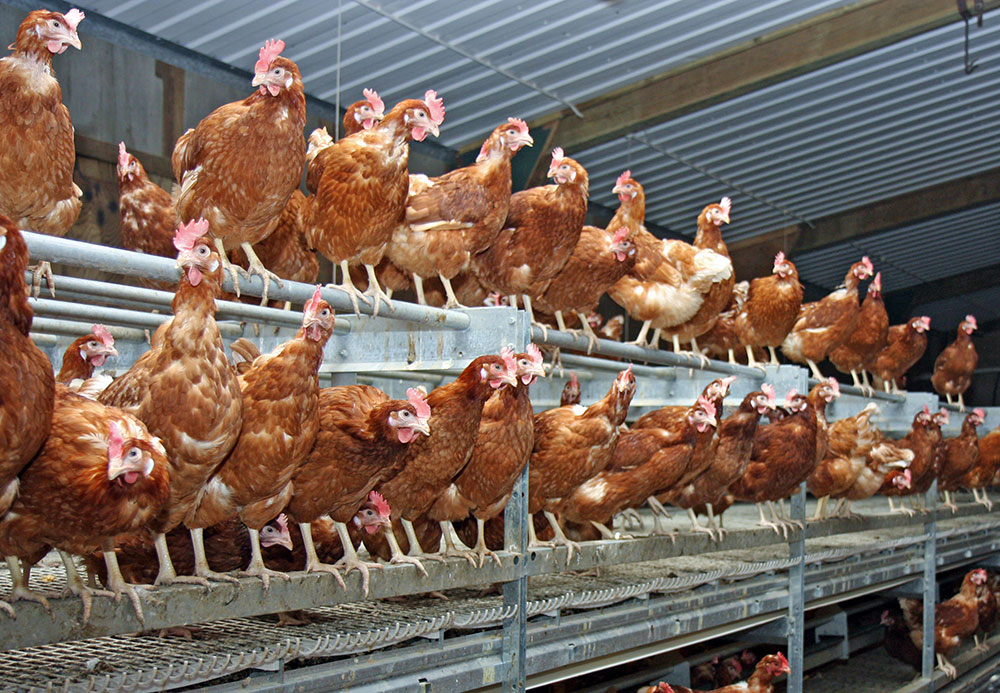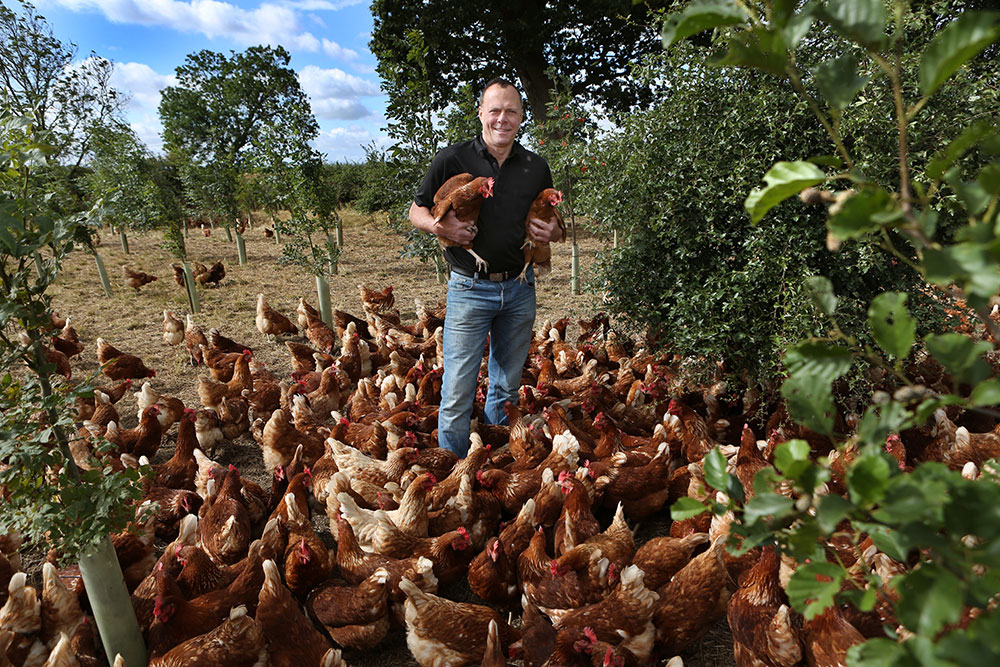
Tesco agricultural manager John Kirkpatrick has urged free range egg producers not to fight amongst themselves over methods of production.
His appeal came after Dan Wood of Blackacre Farm Eggs started a campaign against multi-tier production units. Launching its ‘no multi-tier here’ campaign, Blackacre has said, “We’ve been able to keep up with demand without compromising our principles.” And Dan has called for new labelling to distinguish between eggs produced on multi-tier units and those produced in traditional flat deck sheds.
At a poultry meeting organised by the National Farmers Union (NFU) near York, John Kirkpatrick, Tesco’s agricultural manager for poultry and eggs, said the supermarket supported multi-tier and he appealed to producers not to fight amongst themselves.
Award winning free range egg producer Phil Twizell said he thought that multi-tier was better for bird welfare than flat deck.

Phil Twizell told FarmingUK: “Multi-tier systems give the birds more chance to express their natural behavior. In the wild these birds would have had access to trees and perching. The multi-tier system is like a big metal tree allowing birds to find the height they are comfortable with allowing birds to.”
There has been a trend in the industry from flat deck to multi-tier units in the last few years, but Dan says that farmers like himself, with smaller, traditional sheds, are in danger of being forced out of business because they cannot compete on cost. He says that consumers should know if their free range eggs come from multi-tier units.
“I come from a small family business in Somerset, where we have been producing eggs for the last 40 years. We use small, traditional free range methods to produce our eggs. My concern is that, as free range sheds get bigger and bigger, and production costs are driven lower, it puts us small, traditional farmers at a disadvantage. If we can’t get the differentiation made we risk going out of business,” he said during a national radio interview. He said he was concerned about consumers’ perceptions of how and where their eggs were being produced.
On its web site Blackacre says, “We’ve been able to keep up with demand without compromising our principles, supporting the traditional independent farmer by partnering with other likeminded family-run farms in the south west.”
It says, “Our girls are free to roam and ramble throughout the day, soaking up those all-important daylight hours before returning to sleep in their single tier sheds at night. This combination of love, care, freedom and fresh air means we have happy hens, ducks, quails and geese on our farm, and truly happy birds lay the best of the bunch.”
Dan conceded during the radio interview that birds in multi-tier units were free range and that they were free to range during the day. The British Free Range Egg Producers Association (BFREPA) is hoping to fund scientific research that will compare multi-tier production with traditional flat deck systems.
However, FarmingUK has previously reported on a comparison that was carried out between the two systems of production by Yorkshire farmer Mike Wilkinson. Mike, who farms near Thirsk in North Yorkshire, found during his comparison that the birds in his multi-tier unit were less stressed, that they maintained feather cover better than his other birds and that they ranged more than the birds in his flat deck shed.
Both flat deck and multi-tier units can be used to house large numbers of birds, but both provide access to the range and both are governed by the same limits on stocking densities for commercial layers. Multi-tier production is a system that is approved by the RSPCA and is covered in its welfare standards for laying hens.
“Both multi-tier and flat deck systems are approved by the RSPCA; there are pros and cons for both systems, but both meet the welfare standards required by the RSPCA and it is up to individual producers to decide which method of production is best for them,” BFREPA’s director of policy, Robert Gooch, told FarmingUK.
BFREPA says it represents producers who use both types of system. Association chairman Myles Thomas said, “The key point for the public to understand is that, regardless of the choice of housing system, the same high welfare standards are applied and all birds have access to the range, to food, to water and space to move around in. There are many different ways to produce free range eggs and it’s in the hands of the producer to decide which system works best for them and their birds.”
During his radio interview Dan admitted that, as far as the legislation was concerned, eggs produced in multi-tier systems were considered free range. “It’s just from our point of view, as a smaller, traditional free range farmer with a single tier shed, we are in danger of not being able to compete in the market place and we need to make the general public aware that, if they want to purchase their eggs in the supermarket for 79p for six free range eggs, they are not going to be produced in the methods that we use, and we just need to make the differentiation so that we can continue to survive in the market place,” said Dan.
He said he wanted to see more labeling so that consumers would know if they were buying eggs from multi-tier units. “We believe that a clearer labeling system would achieve exactly what we need. We want the consumer to be able to make an informed choice, so if a consumer goes into a shop to buy his free range eggs we would like that consumer to be able to decide if they want to buy free range eggs cheaply, then they need to know they are going to come from a multi-tier system potentially.”
BFREPA’s director of policy, Robert Gooch, said he would not like to see more labeling to differentiate multi-tier. “I think the rules are set out,” said Robert, who said that the vast majority of BFREPA members had been approved and assured by the RSPCA and Lion. He said that more labeling would simply confuse consumers.
Robert said that one option for consumers who wanted eggs from smaller units was to buy organic. “Consumers should be able to differentiate between different types of farm and farming system, and at the British Free Range Egg Producers Association we represent not only free range egg producers but also organic egg producers. If consumers want eggs produced from a farm of smaller units then they can buy organic eggs, which are generally produced on farms which are much smaller than a typical free range farm,” he said.
Dan said that would not solve the problem for small scale free range producers. “Robert has a point that if people want to pay more for their eggs they can go and buy organic eggs and those eggs will be produced in smaller sheds because the legislation states that that has to be done.
“But there are hundreds of smaller farmers out there, like ourselves, who are producing normal free range eggs, not organic, just the free range egg that’s on the shelf. And the danger is that if we can’t get that differentiation made between the multi-tier systems that can produce these eggs at far lower production costs than I can then these hundreds of little producers will go out of business. It’s like the dairy industry,” he said.
Blackacre says it intends to take its campaign against multi-tier on the road through exhibitions, conferences and school visits. On its web site, it says: “With the nation’s appetite for free range eggs ever increasing, we’ve hatched a plan for an educational campaign to give people a better understanding of their egg’s journey from the farmyard to the kitchen.
“We believe that people have a right to know where their food comes from, so our ‘no multi-tier here’ campaign sets out to ensure that everyone is able to make an informed decision when buying their eggs.”
It says the term free range refers to everything from multi-tier units housing thousands of birds to a handful of hens in a family’s back garden. “Our ‘no multi-tier here’ campaign will highlight the fact that many free range eggs are now produced in multi-tier sheds, which can house up to 64,000 hens on multiple levels under one roof.
“As prices have been consistently driven down over recent years, many free range poultry farmers have embraced these multi-tier systems to keep up with consumer demand, in the process reducing feed consumption and increasing flock numbers in the same size shed.”
Phil Twizell said: “It is wrong to suggest that multi-tier units house more birds than traditional flat deck systems. Both systems are allowed the same number of birds per square production comes from better welfare. If the birds are happier on this system then as a farmer I am happier. My responsibility is to the welfare of the birds. They like to scratch on the floor but they also like to perch high.”
Dan Wood said that eggs were enjoying a boom at the moment, with sales up. However, he said if increased sales were simply driven by reduced costs then small scale producers would not be able to compete.
